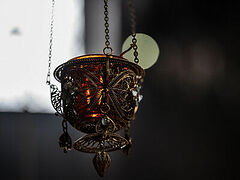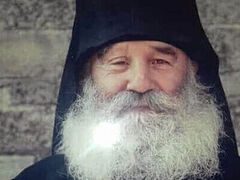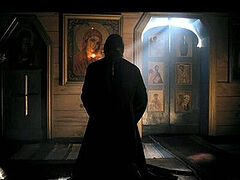What role do miracles play in the life of an Orthodox Christian, and indeed of any human being? Why does sometimes a believer pray for a miracle for years—for example, for healing—but it doesn’t happen, while an unbeliever may venerate an icon or some relics only once and recover? Archpriest Valerian Krechetov, the honorary rector of the Church of the Protecting Veil of the Most Holy Theotokos in the village of Akulovo near Moscow, has reflected on what a miracle is in itself and what attitude we should have towards it.
We call our faith divinely revealed. That is, it was revealed to us by God Himself. As the incarnate Lord said, For this cause came I into the world, that I should bear witness unto the truth (Jn. 18:37). There are various phenomena—some explain them one way, others differently. Even the laws of nature aren’t easy to understand, because Who is the Law-Giver? It is customary for us to attribute to miracles something that is contrary to the laws of nature. But the laws of nature themselves are also a miracle, and very many people still cannot fully explain them.
Faith is the foundation of everything. A person sees miracles when he has faith. And if he has no faith, then many miracles will be overlooked, although they will occur. As it was said: For this people’s heart is waxed gross, and their ears are dull of hearing, and their eyes they have closed; lest at any time they should see with their eyes and hear with their ears, and should understand with their heart, and should be converted, and I should heal them (Mt. 13:15). But miracles are sometimes genuine and sometimes false. When the Lord spoke about His Second Coming, He mentioned that not long before it, false prophets would deceive many. For example, a person will fly through the air like a bird. In our days planes fly, and for those who don’t know the laws of aerodynamics, this is a miracle. But there are miracles that occur contrary to the laws of nature—these are the miracles of our Orthodox Christian faith.
The alpha and omega of our faith is a miracle. After all, the incarnation of the Son of God was a miracle: the Ever-Virgin Mary gave birth in a supernatural way, and not in a natural way. This happened in the same way as when the Lord passed through closed doors and appeared to His disciples. The Lord was born miraculously, and His Resurrection transcends all the laws of nature. The authors of one atheistic book wrote: “This (the Resurrection of Christ) could not take place because irreversible processes begin in the body.” True! This didn’t happen according to the laws of nature: this happened contrary to them.
A miracle is when something didn’t exist, wasn’t there, but then it appeared as if from nowhere. We cannot imagine what it means to emerge from non-existence! The greatest miracle is the creation of everything by Divine power. Moreover, everything continued in an extraordinary way. We call it the “law,” but it didn’t exist before the creation of the world! There was no sun, no Earth, but then they appeared—and this was a miracle. Molecules and atoms are interconnected according to certain laws. A tree grows from a small seed, and a linden won’t grow from an acorn—this is a law. These laws are intertwined so that all living beings depend on each other, help each other, and this interweaving is also the greatest miracle. We are used to considering a kind of miracle that goes beyond the boundaries of the environment around us. But supernatural things do occur within the framework of natural processes!
“If something has been decided there, it starts happening here”
I spoke with one medical doctor. His colleague once complained to him: “It seems that everything is fine with me, but still something is lacking.” The doctor said: “You are not baptized!” Indeed, he was ashamed to get baptized; he was the head of a department in a big city, and a high profile. This is a long story. The doctor said to him: “Well, come to us in Moscow: there are many churches here and no one will recognize you.” The doctor was our parishioner; he warned me that his colleague would come to get baptized. At the end of the service I saw an unknown man entering the church. He was nice, but he looked a little frightened and confused. It was him. We talked, and then the Sacrament of Baptism was performed. And then he told me the following story. The day before, the following thought had crossed his mind: “If there is a sign for me, I’ll go and get baptized.” He went to bed, and the next morning he woke up and thought, “There are no signs.” He decided to turn on the radio. By that time the program, “The Pastor’s Word”, was being aired on both radio and television. He turned on the radio and the first thing he heard was the verse: An evil and adulterous generation seeketh after a sign; and there shall no sign be given to it (Mt. 12:39). He exclaimed: “Okay, I got the message!”—and went to the church.
A distinctive feature of the Orthodox Christian faith is the miraculous. In our days, many talk about Islam—but you can’t find a single miracle there. Mohammed didn’t perform a single miracle! No one pays attention to this, just as many ignore our Orthodox Creed. No other religion has a Creed like ours. Not only is it a clear and detailed statement of the faith—it was also approved at the seven Ecumenical Councils. Not just one person said it, but many accepted the Creed with one mind. When there were disputes with the Arians, everyone quoted the Holy Scripture, interpreting it in their own way, and this could have gone on for a very long time. St. Basil the Great said, “Let’s seal the church and pray. The church will belong to the party that the Lord opens it to.” The heretics (the Arians) prayed, but nothing happened. When St. Basil the Great came with his clergy and prayed to God, thunder sounded—and the church doors opened. This is a historical fact.
There is a debate about Ukraine now, but this kind of debate has been around for a long time. There was the spiritual author, preacher and Master of Theology, Archpriest Gregory Dyachenko, whom Father Sergei Orlov—a priest with whom I was honored to serve—knew personally. He shared the following story: In Ukraine there was a dispute between a group of Uniates and a group of Orthodox on whose faith is true. In order to avoid an argument, they decided that both parties would bless some water (each its own), and the vessels would be sealed for a time. After forty days, the vessels were opened—the water of the Orthodox was clean, and the Uniates’ water was spoiled. And take the Armenian Church, for example. For all their antiquity, the Holy Fire didn’t descend to them despite their prayers. The Holy Fire itself is a testimony from above, not from men. One of our Orthodox priests, a physicist, put a silver plate into the flame immediately after lighting it, and then measured the temperature of the plate with an instrument—it was forty-two degrees! How can fire burn at forty-two degrees? A miracle is evidence of the invisible world.
I was recently in Volgograd. I looked around—hundreds of miles to Moscow! The Nazis had covered such a large territory! I personally remember from my childhood how during WWII, we were near Volokolamsk. In the evening we fell asleep, and the next morning we woke up—and the Germans were already here. Only some sixty miles separated them from Moscow. How did they fail to capture Moscow? God did not will it. Because if something has been decided there, it starts happening here. This is the greatest miracle.
“Illness is important for salvation of the soul”
A miracle can occur to any person, regardless of whether he is a church-goer or not. Remember, in the parable about the workers in the vineyard, the last received as much as the first. And when the first were indignant, the lord of the vineyard replied: Is it not lawful for me to do what I will with mine own? Is thine eye evil, because I am good? (Mt. 20:15). The trouble is that only what happens here in relation to earthly life is often considered a miracle.
And the most incomprehensible miracle is the miracle of the conversion of the human soul to God. When St. John the Evangelist was preaching the Gospel, a high priest tore an ox in two and asked him: “Can you do the same?” The apostle replied: “The Lord did not send me to tear oxen apart, but to save human souls.” It is the most important thing! Illness is important for salvation of the soul. If a person is needed for something here on earth, the Lord keeps him. There are amazing prayers in the service of Holy Unction; in one of them we read these words: “Cast out by Thy Mighty Hand every sickness and malady so that being raised, he may serve Thee with all thanksgiving.” Bishop Arseny (Zhadanovsky) said that the Lord does not hesitate for a moment—if He sees that someone’s soul is ready, He takes it. I knew a priest who went through both prisons and the war. Once, when he was giving unction to a woman, she asked him: “Father! I’m probably going to die?”—”Are you ready?” he asked. “No, father, I’m not ready!” she replied. “Then you won’t die. God does not take those who are not ready.” After the Unction she lived for twenty or thirty years. I was still a boy then.
So people ask: “Why has this happened? What for?” This is the will of God! A classic example: When everything is getting worse, worse and worse, remember Lazarus the Four Days Dead! This sickness is not unto death, but for the glory of God (Jn. 11:4). Lazarus had to die to be resurrected later, and four days had to pass after his death. Just like the daughter of Jairus. When the Lord was going to heal her, she died. Be not afraid, only believe (Mk. 5:36). She had to live, as did the son of the widow of Nain. But for those who did not want to receive the Good News of Christ, those resurrections did not work. Do you remember? The chief priests consulted that they might put Lazarus also to death (Jn. 12:10). This was because he was a witness to the resurrection.
The Lord worked many miracles—and who turned to Him? He was crucified. We read on Holy Friday:
“My people, what have I done to you or how have I disturbed you? I gave light to your blind; your lepers I cleansed; a bedridden man I raised up. My people, what have I done for you, and how have you repaid Me? In place of the manna you gave Me gall; instead of water, vinegar; instead of loving Me you nailed Me to the Cross.”
So much for miracles. Free will is at the core of everything. One unbelieving girl, wishing to tease a religious friend, asked her: “Can God create a stone that He cannot lift?” The girl was confused and came with this question to her father. He replied, “This stone that the Lord created is man’s free will.” The Lord does not force anyone. If a person himself sighs: “O Lord!...”, He will have mercy on him. Our faith, proclaimed to us in full by the incarnate Son of God, bears witness to miracles. Nowhere else is there such a number of miracles—both in everyday life and in our whole life. But the transformation of the human soul and its salvation is the miracle that is central to Christianity.




